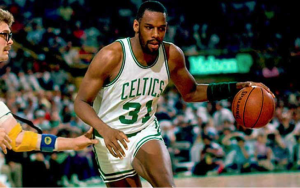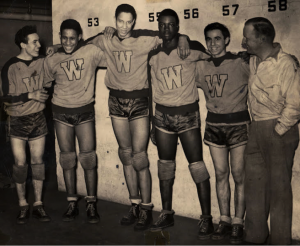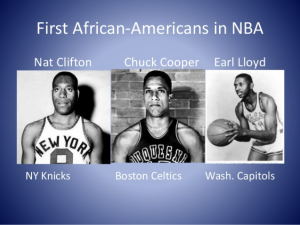Pittsburgh Westinghouse High School and Duquesne University product Chuck Cooper was the first African-American player drafted into the NBA.
By Timothy Cox
For the New Pittsburgh Courier, May 2019
WASHINGTON, DC — On Tuesday, April 9, 2019, inside the Boston Celtics’ locker room, guard Brad Wannamaker, said he was familiar with the name Chuck Cooper.
Wannaker, a former University of Pittsburgh guard, also proudly noted that he also knew that Mr. Cooper had just been named to the NBA’s Naismith Basketball Hall of Fame on April 2, 2019.

In April 2019, Chuck Cooper of Pittsburgh, was named posthumously to the Naismith Memorial Basketball Hall of Fame in Springfield, Mass. (Special photo from Chuck Cooper Foundation).
________________________________________________________________
Both Wannamaker and Cooper share common bonds – both are Pennsylvania natives, played their college ball in Pittsburgh, and have worn the lucky green shamrocks of the vaunted Boston Celtics.

Philly native, Brad Wannamaker, played his college ball at the U. of Pittsburgh. During an April 2019 game in DC, the Boston Celtics guard paid homage to Chuck Cooper for being the first black player drafted to the NBA with the Celtics in 1950. (Special Photo).
________________________________________________________________
After spending his first six years playing overseas, Wannamaker a 6-4/210 pound Celtics rookie, sees limited action with a team featuring all-star guards Kyrie Irvin, Jayson Tatum and Marcus Smart. But during this final home game at the Washington Wizards’ Capital One Arena, Wannamaker, 29, scored 17 points and showed dazzling ball-handling skills in a 116-110 victory over the struggling home-team, who finished with a dismal record of 32 and 50 for the 2018-19 season.
Celtic great, Cedric “Cornbread” Maxwell, was also in DC plying his duties in the broadcast booth – announcing for his former team. He too said he was elated upon hearing reports about Cooper’s good fortunes. He was equally overjoyed that Wannamaker was aware of his predecessor. “Good to know the younger players pay homage to the older guys,” he said.
“He’s the Jackie Robinson of our sport. Who knows what he had to encounter as the first black drafted into the league. He was such a nice man, it’s certainly well-deserved,” said Maxwell, an eight-year Celtic who earned two NBA titles with the team after starring at UNC-Charlotte where he earned the nickname “Cornbread” – mimicking the Jamaal (Keith) Wilkes’ character in the 1975 film ‘Cornbread Earl & Me.’

Cedric “Cornbread” Maxwell is a 1980s Celtics legend and current team broadcaster, but still shows much love to Chuck Cooper and to those who laid the foundation for blacks to enter the NBA. (Special photo).
________________________________________________________________
The Wizards played without injured center Dwight Howard and ailing guard John Wall. Both players were inside the team’s locker room after the game.
However, Ernie Grunfeld, the team’s recently-fired general manager, must now be replaced – adding to team woes.
Speaking of Cooper, the legendary former Duquesne University small forward, was a quick, powerhouse player during his collegiate days and helped propel the Dukes onto a well-respected national reputation in the National Invitational Tournament (NIT) in the early 1950s, before the NCAA’s March Madness attained its current prominence.
Cooper was a resident of Pittsburgh’s East Liberty section, and graduated from (George) Westinghouse High School, along with his longtime pal and teammate, Bill Nunn Jr., the Pittsburgh Steelers’ scout noted for recruiting black college football players in helping the Steelers become six-time Super Bowl champions.
Eddie Jefferies, the retired sports writer for the New Pittsburgh Courier, said he’s likewise ecstatic after learning of Chuck Cooper’s election to the NBA Hall of Fame.
“I only wondered why it took so long,” asked Jefferies, adding that Chuck was one of several black athletics who helped build Duquesne’s reputation as a national college basketball powerhouse in the early 1950s. Along with Cooper, players like Jim Tucker, Fletcher Johnson, Sihugo Green, Willie Somerset, Dick Ricketts and his brother Dave Ricketts , helped propel the downtown Pittsburgh campus as a perennial dynasty, said Jefferies.
In interviews with Cooper, Jefferies recalls a “humble and sensitive personality.”He said Cooper also re-cited Celtics’ owner Walter Brown’s unique quote in reacting to Boston drafting a “colored player” in which the Celtics’ owner quickly stated he didn’t care if Cooper were “striped, plaid or polka-dot,” as long as he can play great basketball.
Chuck Cooper III, Chuck’s son, is founder of Pittsburgh-based Chuck Cooper Foundation, and credits several associates for keeping his father’s name enlightened amongst the Hall’s prospective candidates.
At Duquesne, Cooper earned All-America honors in becoming the first African drafted by an NBA team (Boston Celtics). On April 25, 1950, he was the 13th selection in the second round of the NBA draft.
Born Charles Henry Cooper in Pittsburgh, on September 29, 1926, Cooper III said his father was a multi-sport star at Westinghouse High, leading the Bulldogs to a City League hoops title as a senior. Chuck’s older brother, Cornell Cooper, was his inspiration and a world-class track and field athlete who competed against Jesse Owens.
After high school, Chuck Cooper played ball at historically black West Virginia State College. After a semester, he was drafted into the U.S. Navy for two years before enrolling at Duquesne, said Cooper III.

At Westinghouse High School in Pittsburgh, Chuck Cooper Jr. (center) was an outstanding hooper, but followed the lead of his older brother, Cornell Cooper, a standout track and field athlete. (Photo Courtesy of Chuck Cooper Foundation).
________________________________________________________________
He was one of three African-American players who impacted the NBA in 1950-51, said Cooper III, including Nat “Sweetwater” Clifton and Earl Lloyd.
Clifton became the first African-American to sign an NBA contract, and Lloyd was the first African-American to appear in an NBA game – he took the floor one day before Cooper, Oct. 31, 1950. Clifton and Lloyd were inducted to the Hall in 2014 and 2008, respectively. Again, Cooper was first black drafted in the NBA.
Cooper joins another black Pittsburgher and Duquesne University product, the late Cumberland Willis “Cum” Posey Jr., who was selected to the Baseball Hall of Fame in 2006 and entered the basketball Hall in 2016. Posey played for and owned the acclaimed Homestead Grays in the Negro National League. Homestead is a Pittsburgh suburb.
Following his graduation from Duquesne in 1950, Cooper played several exhibition games with the Harlem Globetrotters.
The Cooper legacy was recently recognized by Duquesne University with the announcement that the Dukes’ on-campus basketball home A.J. Palumbo Center, will be re-named the UPMC Cooper Fieldhouse in Chuck Cooper’s honor, said Cooper III. After a $45 million upgrade, the new facility is set to open in the 2020-21 season.
Chuck Cooper passed away on Feb. 5, 1984 at age 57.
(EDITOR’S NOTE): Enshrinement festivities for the 2019 Naismith Memorial Basketball Hall of Fame Class occurred in Springfield, Mass. on Sept. 5-7, 2019.

These gents were the first three blacks to play in the National Basketball Association. From left, Nat “Sweetwater” Clifton, Chuck Cooper and Earl Lloyd. (Photo courtesy Naismith Memorial Basketball Hall of Fame).
________________________________________________________________
###















